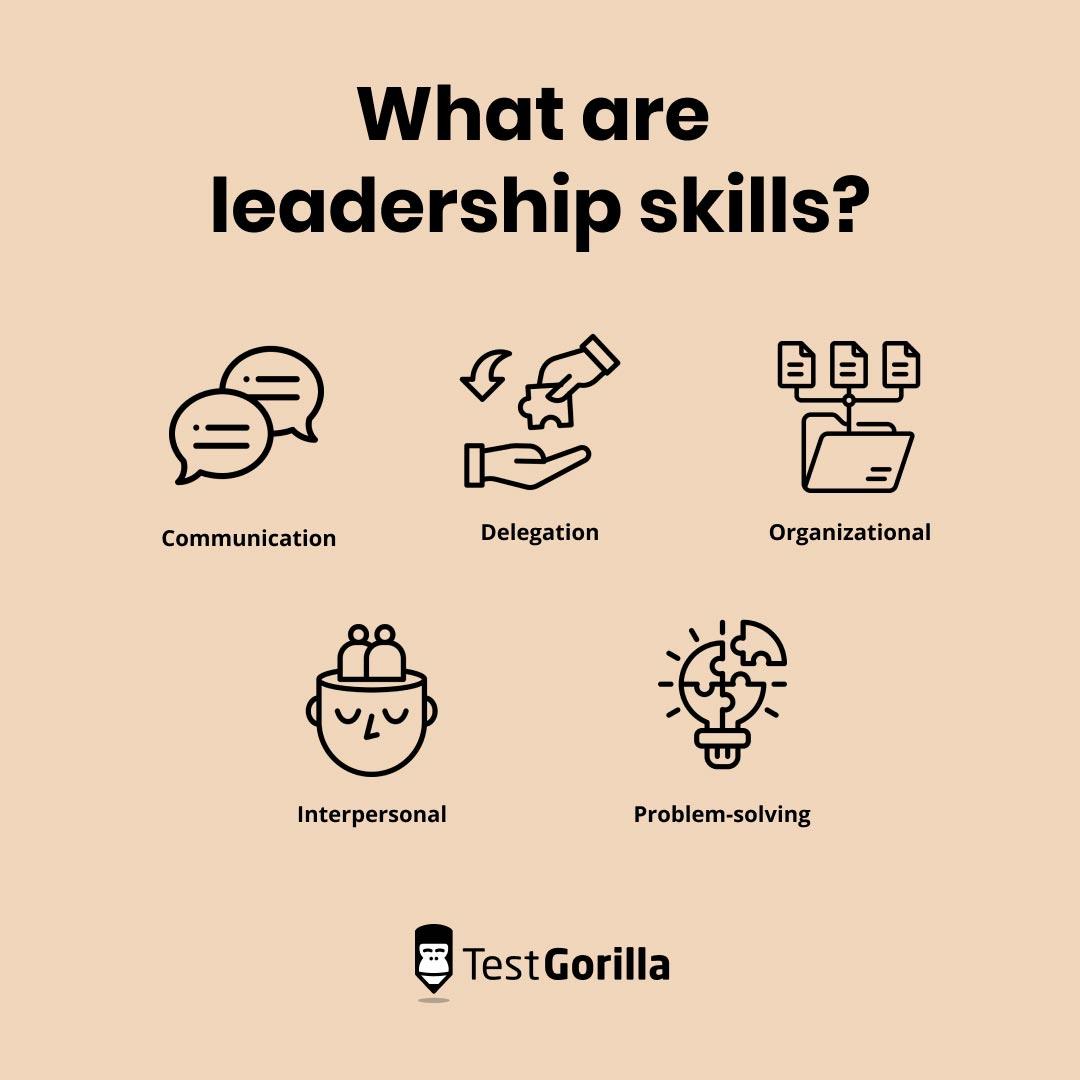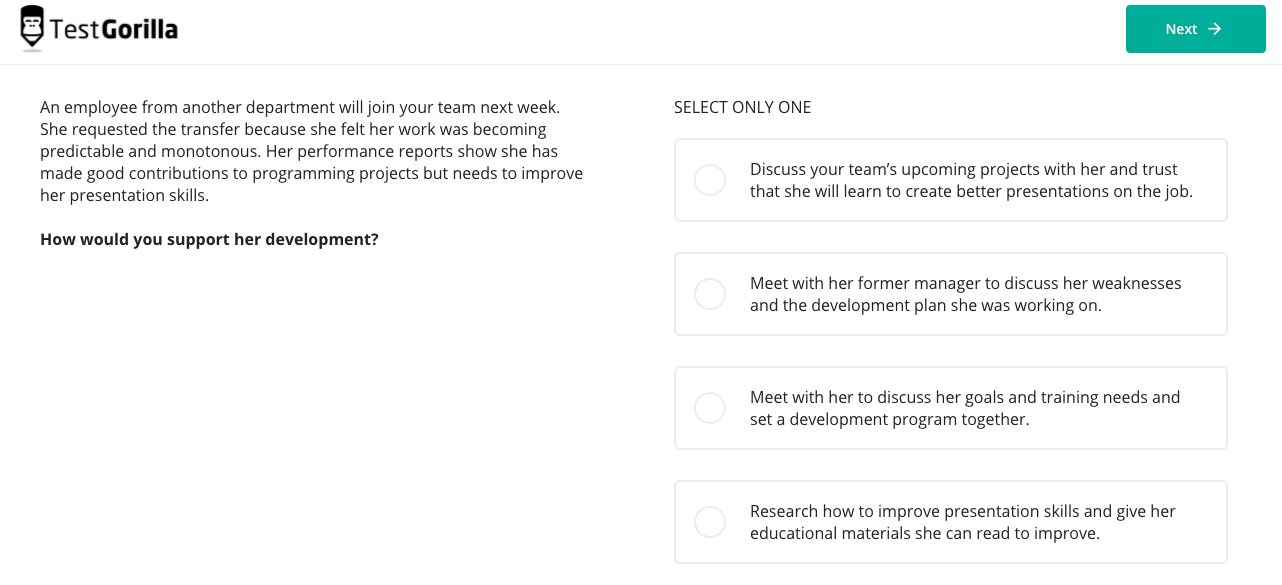The importance of leadership skills in the workplace
The importance of leadership skills in the workplace is clear. After all, great leaders drive economic value.
Individuals with great leadership skills empower teams to achieve their full potential, make decisions, and strategize well to help organizations thrive.
However, leadership is the sum of many traits, and there are numerous great leadership styles knocking about. In this article, we’ll go through the importance of leadership skills in the workplace and how you can evaluate candidates’ leadership skills before you hire them.
What are leadership skills?
To understand why leadership skills are important, we need to first look at the broad spectrum of traits that make a great leader.
Generally speaking, leadership means organizing a group of people to reach desired business goals. They’re confident in leading and paving the way for others to do great things. They also consider how they can seamlessly achieve organizational targets and goals on time, all while managing many people and projects.
Below are some of the most important leadership soft skills that employers look for in top candidates:
1. Communication skills
Communication skills are perhaps the most important skills a leader can possess. Not only do they need to inspire and motivate people working in various departments, but they also need to delegate tasks effectively.
Plus, the ability to give constructive feedback is an important leadership skill that helps improve team performance. Finally, those with good communication skills will confidently communicate in team meetings, one-on-ones, and with many different personality types.
2. Delegation skills
Leaders aren’t expected to do everything themselves. In fact, the ability to delegate is another important leadership skill. Great leaders have the potential to comfortably assign tasks to their team while managing its strategic direction with a hands-off approach.
3. Organizational skills
Skills like time management, prioritization, and scheduling are key organizational skills that all great leaders should possess. These help them set their own direction and help them act as a great example to their team of being as productive as possible and achieving their goals.
4. Interpersonal skills
Great leaders can make their team feel confident in their abilities, motivate all team members, and display emotional intelligence skills such as empathy and listening. They are there for their team in any situation and can manage conflicts and issues while keeping their interests in mind.
5. Problem-solving skills
Problem-solving is also a key skill for leaders. They’re capable of making and enacting successful decisions when problems arise and finding solutions for complex and unexpected situations while delivering projects on time.
The importance of leadership skills
There are several important benefits of leadership skills in the workplace. Below, we’ll go through four of the most important benefits that those with great leadership skills can bring to their organizations.
1. Better financial performance
Investing in candidates with great leadership skills helps your bottom line. They are in charge of ensuring that their teams’ priorities align with business goals and can successfully execute projects that benefit the company’s financial performance.
2. The ability to attract and retain talent
Organizations with leaders who exemplify all of the leadership traits we explored above typically enjoy better employee retention rates since their teams feel supported and motivated by their leaders.
3. Improved customer retention rates
Much like retaining employees, organizations that hire great leaders enjoy better customer retention rates because leaders provide their teams with the guidance and support they need to succeed. This leads to better results and a more positive experience for customers.
4. Increased business agility
Great leaders are confident in managing organizational change. They remain cool, calm, and collected during adjustment periods and are willing to help their coworkers understand why and how the change is occurring. They’re also able to ensure that customers remain satisfied while changes occur.
The best insights on HR and recruitment, delivered to your inbox.
Biweekly updates. No spam. Unsubscribe any time.
How to assess leadership potential
The most effective way to assess leadership skills is with pre-employment skills tests. Compared to an interview, these types of tests measure a candidate’s leadership abilities in an unbiased way.
How leadership skills tests work
Tests like TestGorilla’s leadership and people management skills test help organizations identify candidates who have the ability to lead others and help the business grow using both influence and guidance.
The test covers a wide range of questions on how candidates use leadership to support and develop others towards the organization’s goals. The results from these questions will help hiring teams rank candidates based upon an assessment of each candidate’s skill level.
An example of a question offered by TestGorilla’s leadership and people management test.
The test specifically evaluates whether a candidate has specific leadership skills, such as the ability to:
● Delegate authority and task responsibility
● Plan and support the development of others
● Provide timely guidance and feedback
● Gain acceptance of ideas and plans
Asking candidates many questions to prove their skill level in each of these areas during an interview can be tricky. Using a leadership skills test helps you quantify your candidates’ true skill level.
Hire candidates who can lead the way
If you’re hiring leaders who can create a positive work culture, lead by example, and deliver results, then assess their leadership skills during the hiring process.
Using a pre-employment leadership assessment is the easiest way to evaluate your candidates’ overall leadership skills so that your organization can benefit from this important skill set.
Related posts
You've scrolled this far
Why not try TestGorilla for free, and see what happens when you put skills first.
















